Charles E W Bean, Diaries, AWM38 3DRL 606/273/1 - 1918 - 1937 - Part 7
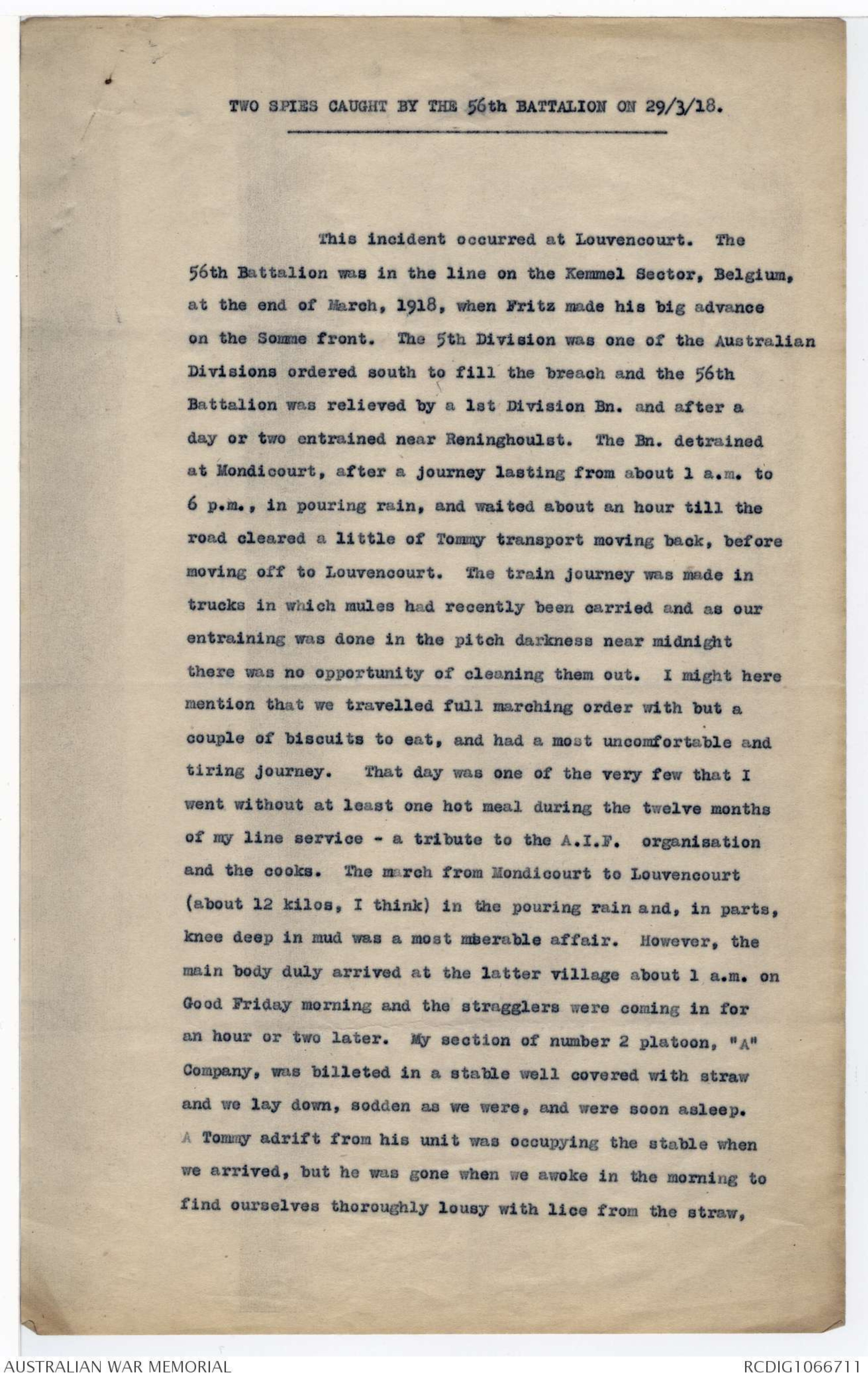
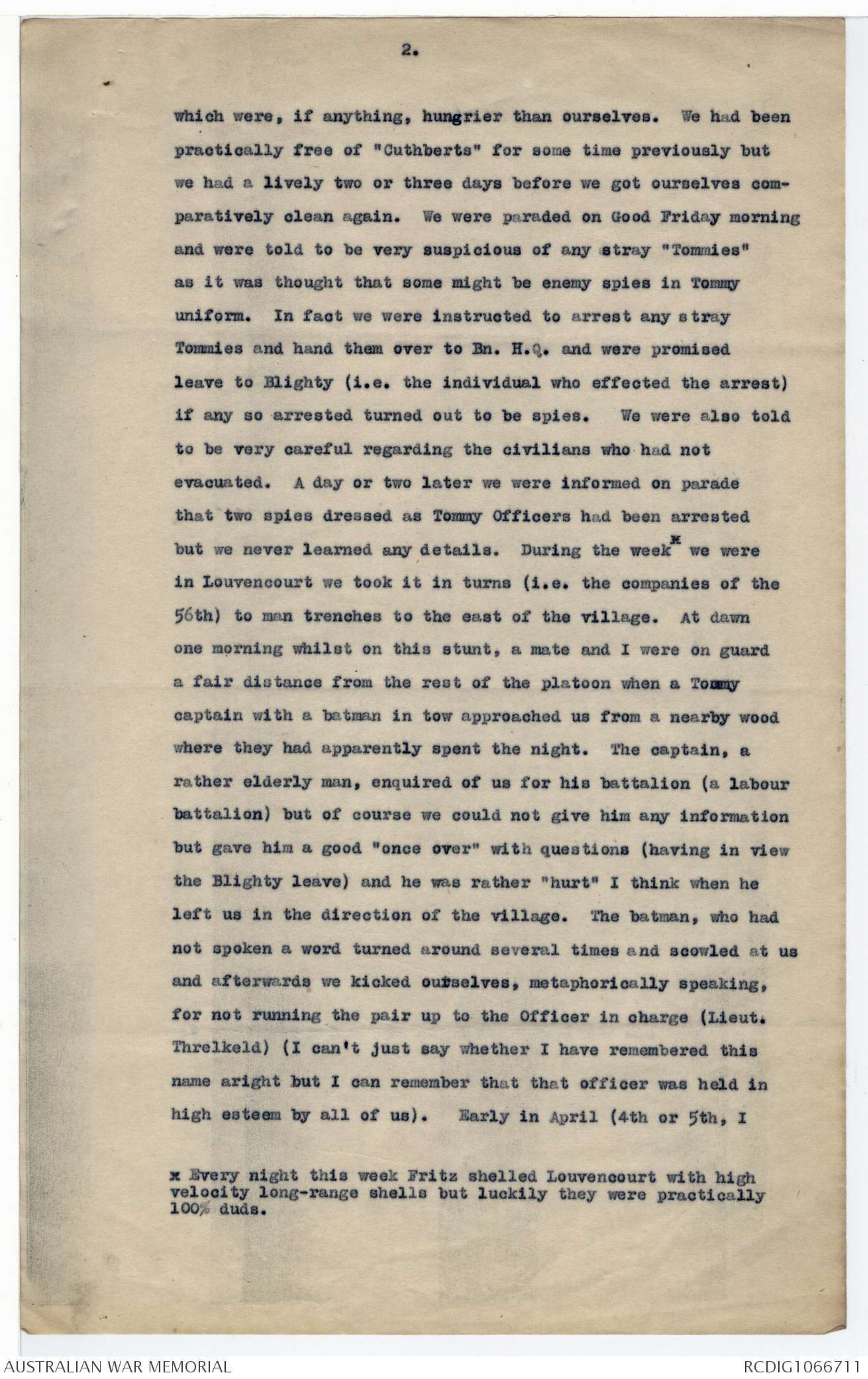
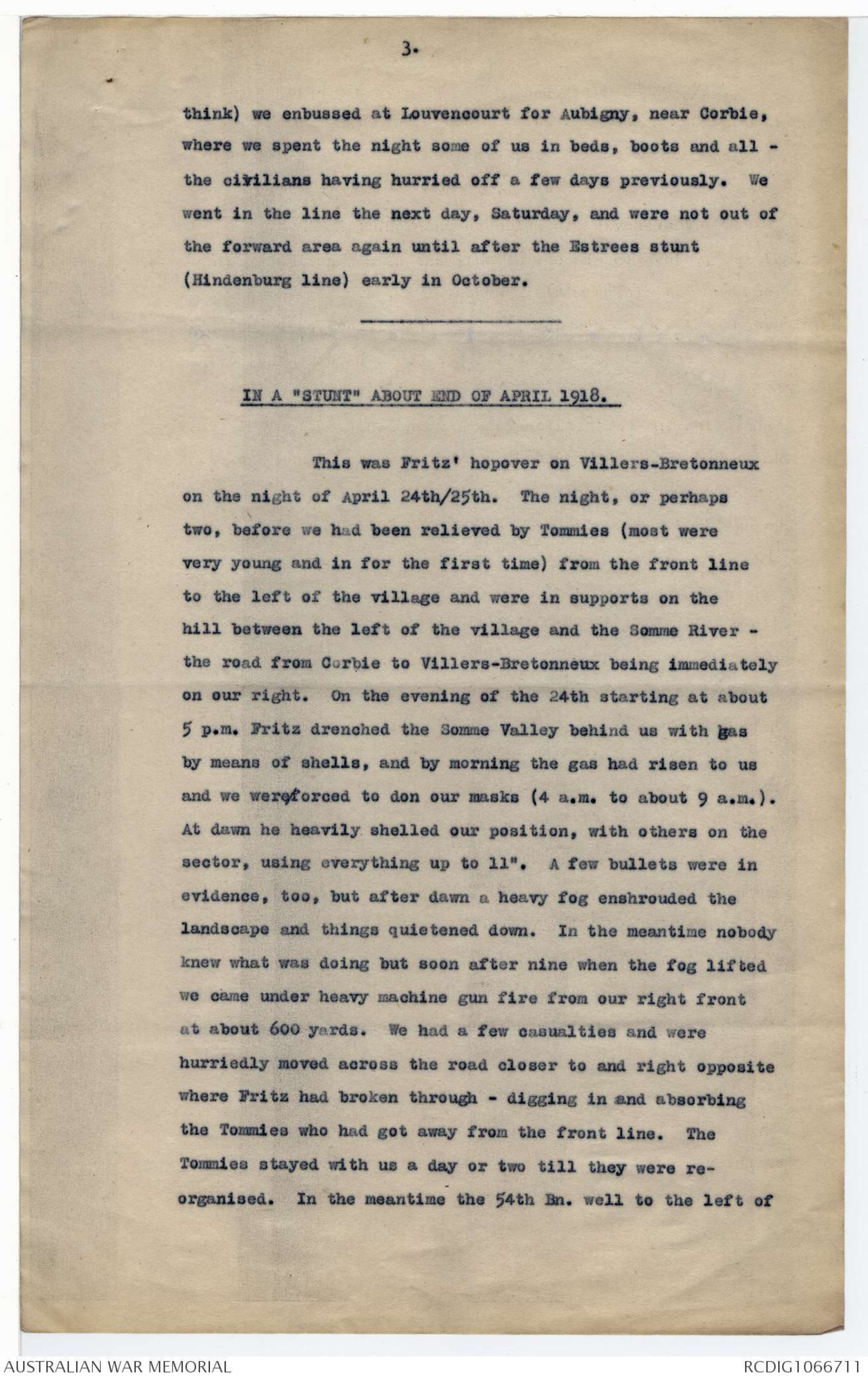
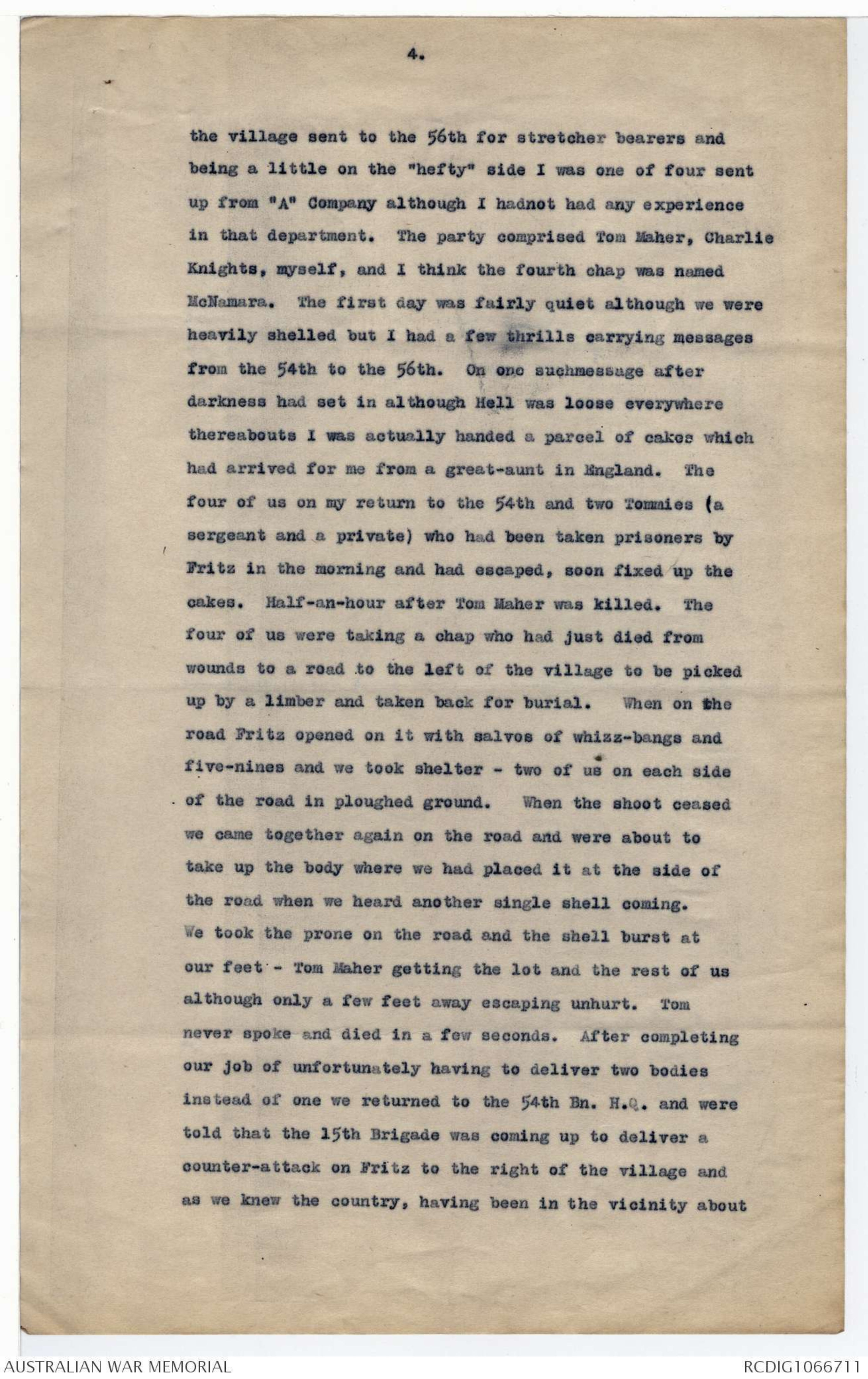
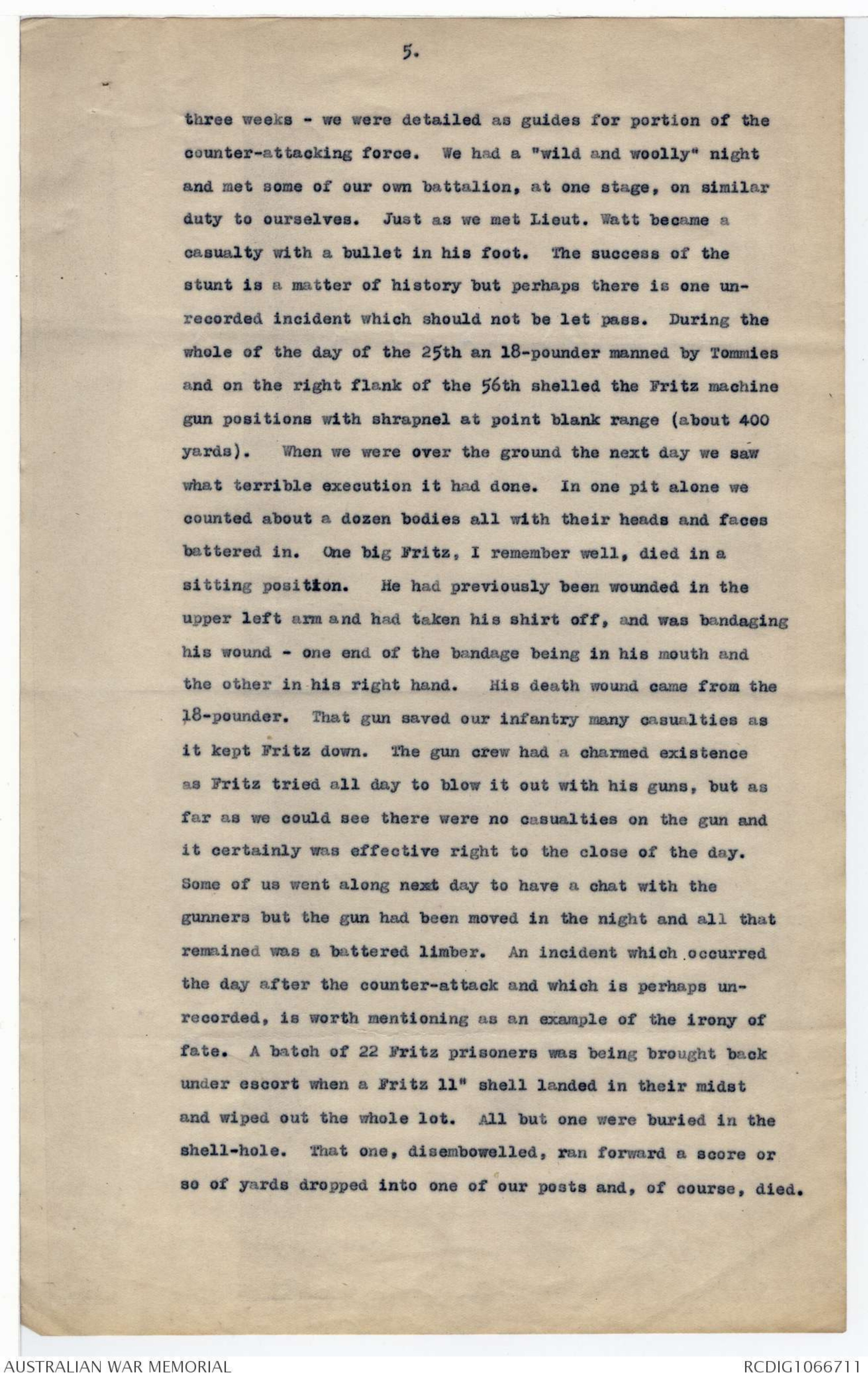
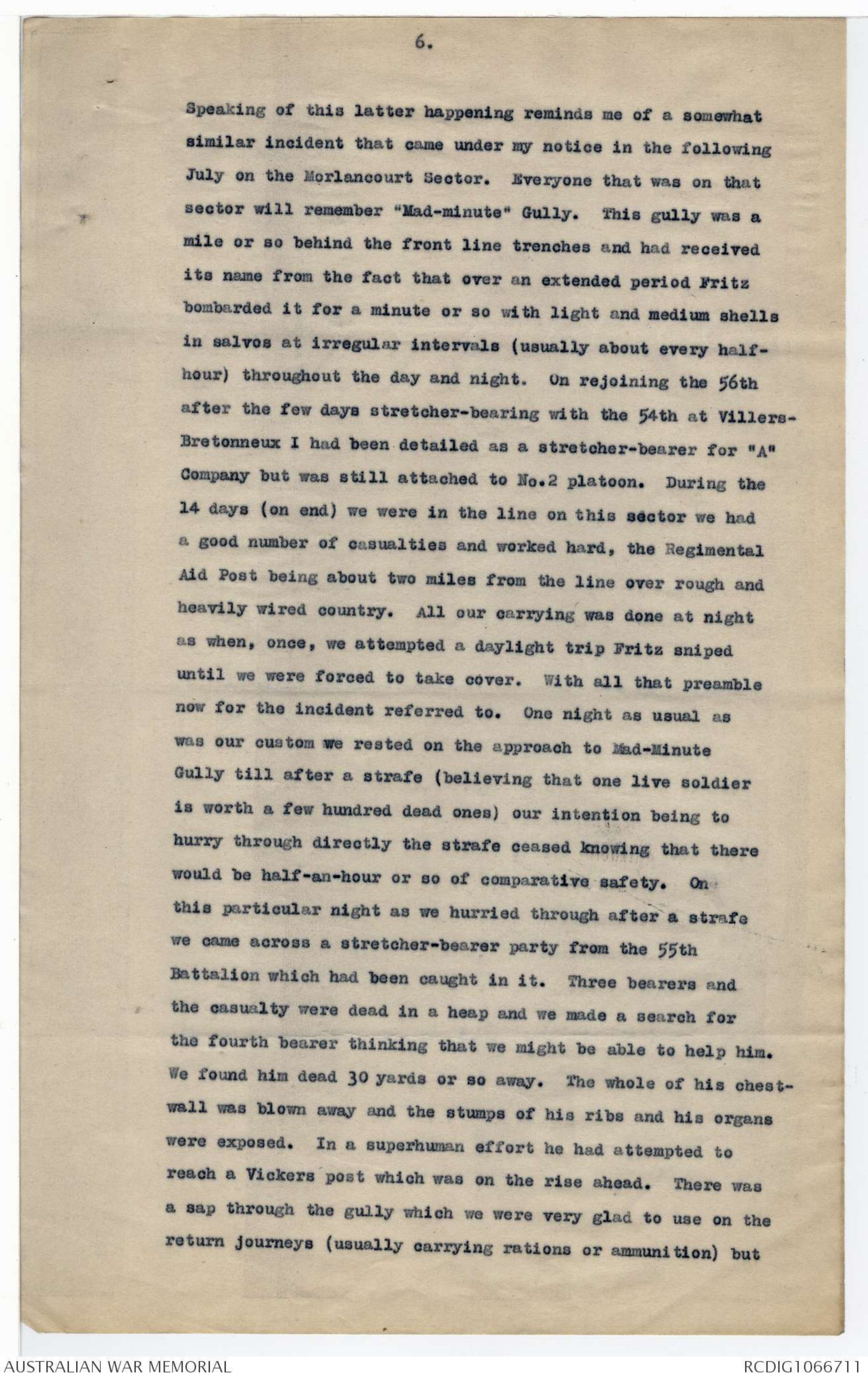
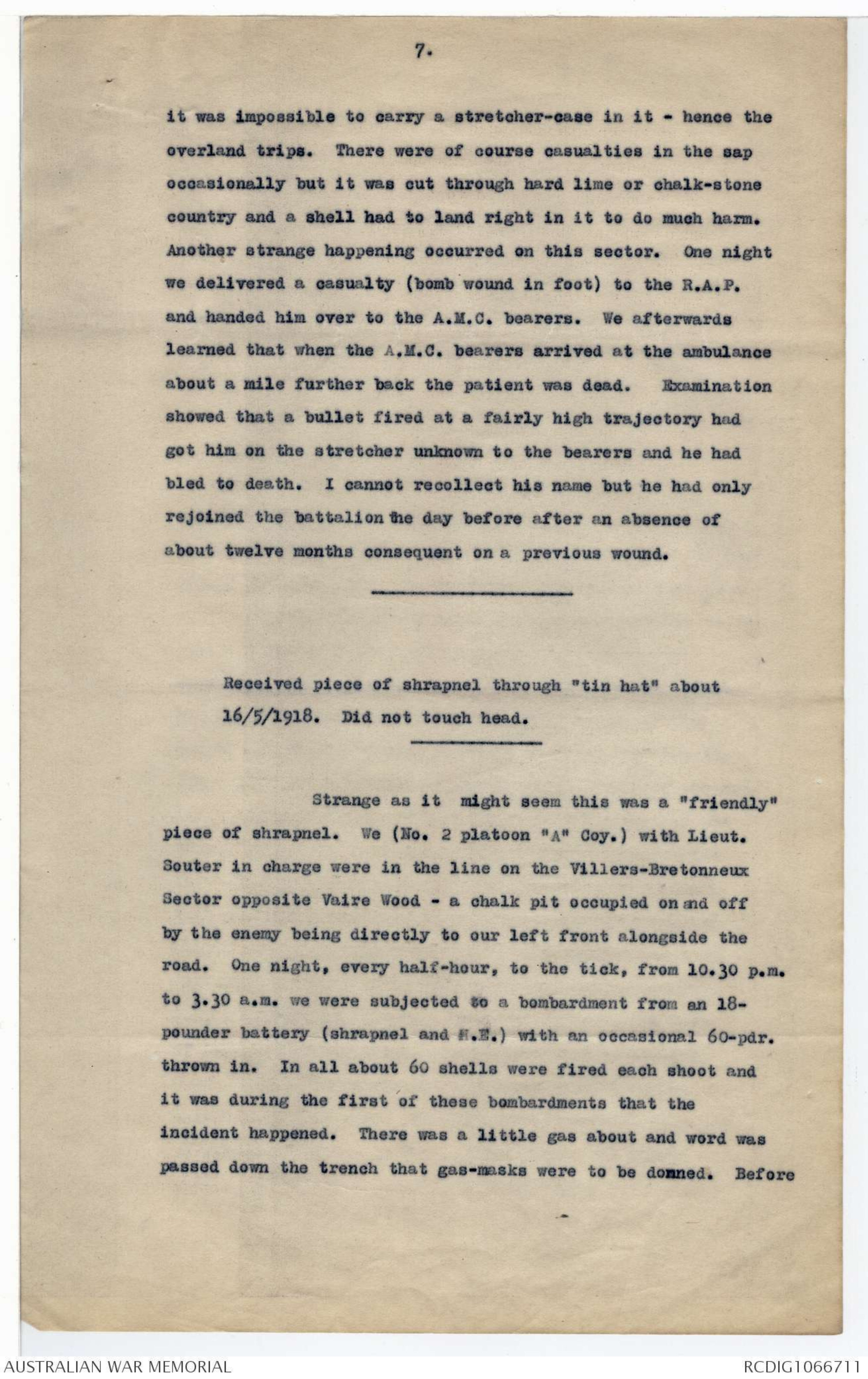
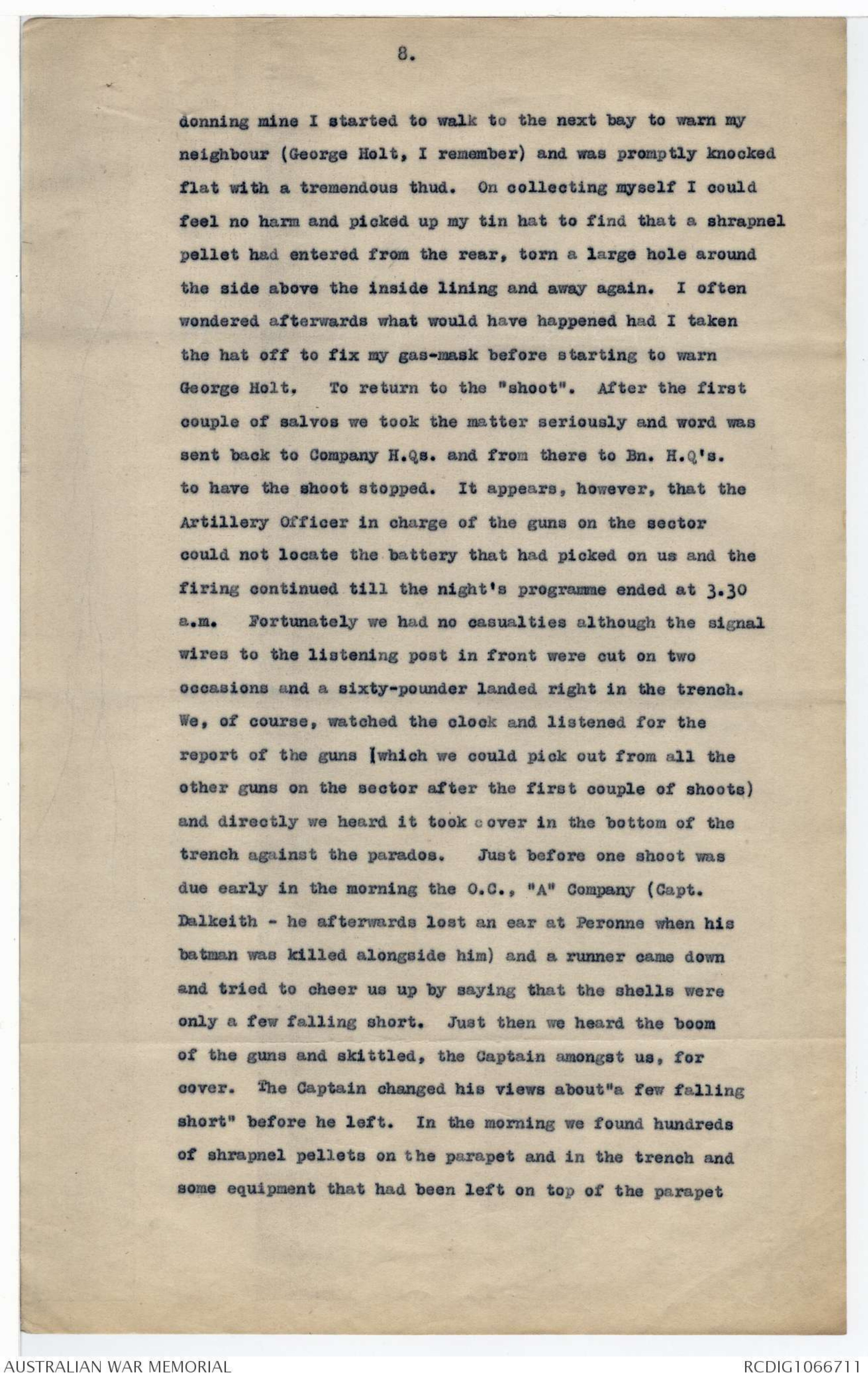
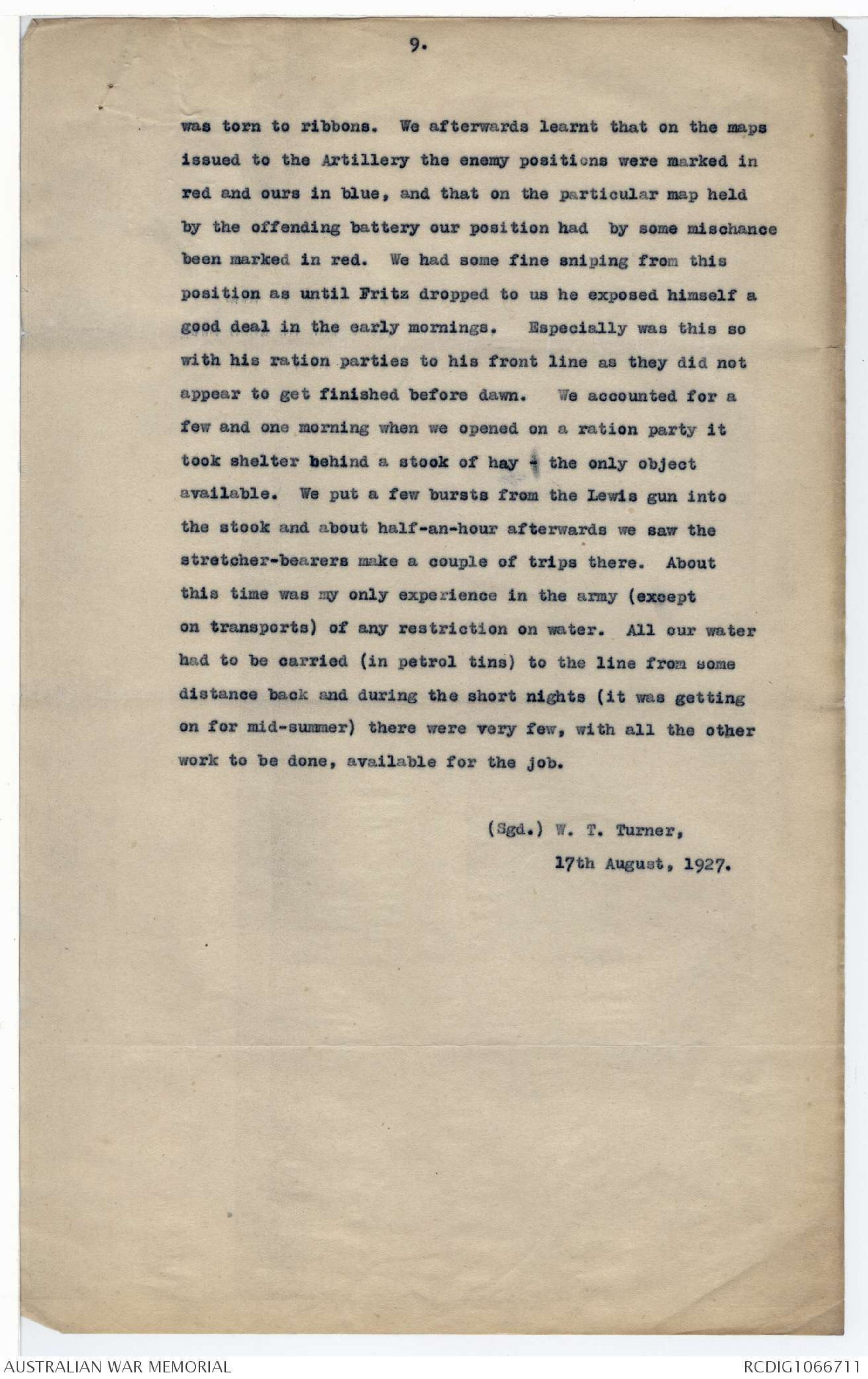
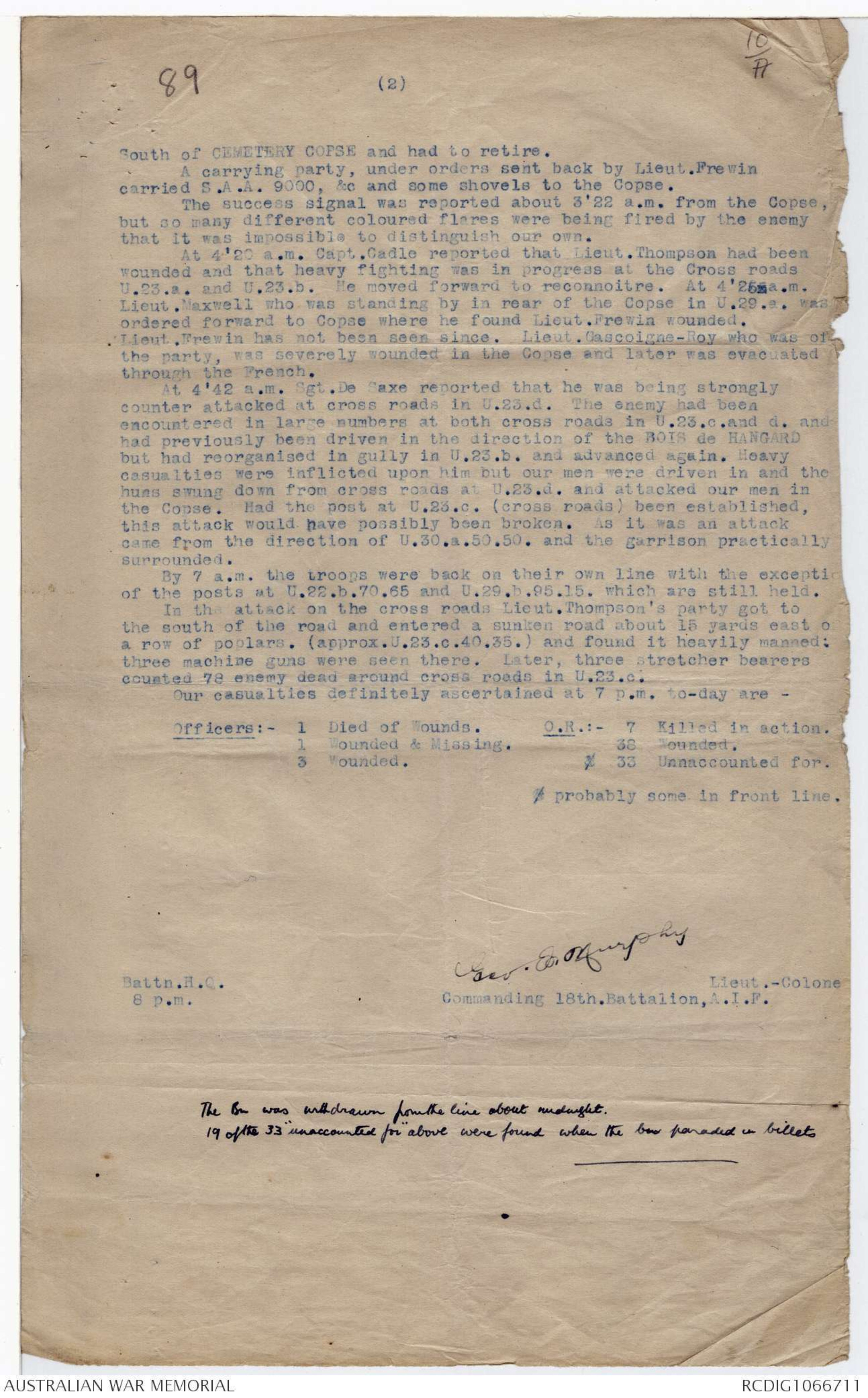
TWO SPIES CAUGHT BY THE 56th BATTALION ON 29/3/18.
This incident occurred at Louvencourt. The
56th Battalion was in the line on the Kemmel Sector, Belgium,
at the end of March, 1918, when Fritz made his big advance
on the Somme front. The 5th Division was one of the Australian
Divisions ordered south to fill the breach and the 56th
Battalion was relieved by a 1st Division Bn. and after a
day or two entrained near Reninghoulst. The Bn. detrained
at Mondicourt, after a journey lasting from about 1 a.m. to
6 p.m., in pouring rain, and waited about an hour till the
road cleared a little of Tommy transport moving back, before
moving off to Louvencourt. The train journey was made in
trucks in which mules had recently been carried and as our
entraining was done in the pitch darkness near midnight
there was no opportunity of cleaning them out. I might here
mention that we travelled full marching order with but a
couple of biscuits to eat, and had a most uncomfortable and
tiring journey. That day was one of the very few that I
went without at least one hot meal during the twelve months
of my line service - a tribute to the A.I.F. organisation
and the cooks. The march from Mondicourt to Louvencourt
(about 12 kilos, I think) in the pouring rain and, in parts,
knee deep in mud was a most miserable affair. However, the
main body duly arrived at the latter village about 1 a.m. on
Good Friday morning and the stragglers were coming in for
an hour or two later. My section of number 2 platoon, "A"
Company, was billeted in a stable well covered with straw
and we lay down, sodden as we were, and were soon asleep.
A Tommy adrift from his unit was occupying the stable when
we arrived, but he was gone when we awoke in the morning to
find ourselves thoroughly lousy with lice from the straw,
2.
which were, if anything, hungrier than ourselves. We had been
practically free of "Cuthberts" for some time previously but
we had a lively two or three days before we got ourselves comparatively
clean again. We were paraded on Good Friday morning
and were told to be very suspicious of any stray "Tommies"
as it was thought that some might be enemy spies in Tommy
uniform. In fact we were instructed to arrest any stray
Tommies and hand them over to Bn. H.Q. and were promised
leave to Blighty (i.e. the individual who effected the arrest)
if any so arrested turned out to be spies. We were also told
to be very careful regarding the civilians who had not
evacuated. A day or two later we were informed on parade
that two spies dressed as Tommy Officers had been arrested
but we never learned any details. During the weekx we were
in Louvencourt we took it in turns (i.e. the companies of the
56th) to man trenches to the east of the village. At dawn
one morning whilst on this stunt, a mate and I were on guard
a fair distance from the rest of the platoon when a Tommy
captain with a batman in tow approached us from a nearby wood
where they had apparently spent the night. The captain, a
rather elderly man, enquired of us for his battalion (a labour
battalion) but of course we could not give him any information
but gave him a good "once over" with questions (having in view
the Blighty leave) and he was rather "hurt" I think when he
left us in the direction of the village. The batman, who had
not spoken a word turned around several times and scowled at us
and afterwards we kicked ourselves, metaphorically speaking,
for not running the pair up to the Officer in charge (Lieut.
Threlkeld) (I can't just say whether I have remembered this
name aright but I can remember that that officer was held in
high esteem by all of us). Early in April (4th or 5th, I
x Every night this week Fritz shelled Louvencourt with high
velocity long-range shells but luckily they were practically
100% duds.
3.
think) we enbussed at Louvencourt for Aubigny, near Corbie,
where we spent the night some of us in beds, boots and all -
the civilians having hurried off a few days previously. We
went in the line the next day, Saturday, and were not out of
the forward area again until after the Estrees stunt
(Hindenburg line) early in October.
IN A "STUNT" ABOUT END OF APRIL 1918.
This was Fritz' hopover on Villers-Bretonneux
on the night of April 24th/25th. The night, or perhaps
two, before we had been relieved by Tommies (most were
very young and in for the first time) from the front line
to the left of the village and were in supports on the
hill between the left of the village and the Somme River -
the road from Corbie to Villers-Bretonneux being immediately
on our right. On the evening of the 24th starting at about
5 p.m. Fritz drenched the Somme Valley behind us with gas
by means of shells, and by morning the gas had risen to us
and we were/forced to don our masks (4 a.m. to about 9 a.m.).
At dawn he heavily shelled our position, with others on the
sector, using everything up to 11". A few bullets were in
evidence, too, but after dawn a heavy fog enshrouded the
landscape and things quietened down. In the meantime nobody
knew what was doing but soon after nine when the fog lifted
we came under heavy machine gun fire from our right front
at about 600 yards. We had a few casualties and were
hurriedly moved across the road closer to and right opposite
where Fritz had broken through - digging in and absorbing
the Tommies who had got away from the front line. The
Tommies stayed with us a day or two till they were re-organised.
In the meantime the 54th Bn. well to the left of
4.
the village sent to the 56th for stretcher bearers and
being a little on the "hefty' side I was one of four sent
up from "A” Company although I hadnot had any experience
in that department. The party comprised Tom Maher, Charlie
Knights, myself, and I think the fourth chap was named
McNamara. The first day was fairly quiet although we were
heavily shelled but I had a few thrills carrying messages
from the 54th to the 56th. On one suchmessage after
darkness had set in although Hell was loose everywhere
thereabouts I was actually handed a parcel of cakes which
had arrived for me from a great-aunt in England. The
four of us on my return to the 54th and two Tommies (a
sergeant and a private) who had been taken prisoners by
Fritz in the morning and had escaped, soon fixed up the
cakes. Half-an-hour after Tom Maher was killed. The
four of us were taking a chap who had just died from
wounds to a road to the left of the village to be picked
up by a limber and taken back for burial. When on the
road Fritz opened on it with salvos of whizz-bangs and
five-nines and we took shelter - two of us on each side
of the road in ploughed ground. When the shoot ceased
we came together again on the road and were about to
take up the body where we had placed it at the side of
the road when we heard another single shell coming.
We took the prone on the road and the shell burst at
our feet - Tom Maher getting the lot and the rest of us
although only a few feet away escaping unhurt. Tom
never spoke and died in a few seconds. After completing
our job of unfortunately having to deliver two bodies
instead of one we returned to the 54th Bn. H.Q. and were
told that the 15th Brigade was coming up to deliver a
counter-attack on Fritz to the right of the village and
as we knew the country, having been in the vicinity about
5.
three weeks - we were detailed as guides for portion of the
counter-attacking force. We had a "wild and woolly" night
and met some of our own battalion, at one stage, on similar
duty to ourselves. Just as we met Lieut. Watt became a
casualty with a bullet in his foot. The success of the
stunt is a matter of history but perhaps there is one unrecorded
incident which should not be let pass. During the
whole of the day of the 25th an 18-pounder manned by Tommies
and on the right flank of the 56th shelled the Fritz machine
gun positions with shrapnel at point blank range (about 400
yards). When we were over the ground the next day we saw
what terrible execution it had done. In one pit alone we
counted about a dozen bodies all with their heads and faces
battered in. One big Fritz, I remember well, died in a
sitting position. He had previously been wounded in the
upper left arm and had taken his shirt off, and was bandaging
his wound - one end of the bandage being in his mouth and
the other in his right hand. His death wound came from the
18-pounder. That gun saved our infantry many casualties as
it kept Fritz down. The gun crew had a charmed existence
as Fritz tried all day to blow it out with his guns, but as
far as we could see there were no casualties on the gun and
it certainly was effective right to the close of the day.
Some of us went along next day to have a chat with the
gunners but the gun had been moved in the night and all that
remained was a battered limber. An incident which occurred
the day after the counter-attack and which is perhaps unrecorded,
is worth mentioning as an example of the irony of
fate. A batch of 22 Fritz prisoners was being brought back
under escort when a Fritz 11" shell landed in their midst
and wiped out the whole lot. All but one were buried in the
shell-hole. That one, disembowelled, ran forward a score or
so of yards dropped into one of our posts and, of course, died.
6.
Speaking of this latter happening reminds me of a somewhat
similar incident that came under my notice in the following
July on the Morlancourt Sector. Everyone that was on that
sector will remember "Mad-minute" Gully. This gully was a
mile or so behind the front line trenches and had received
its name from the fact that over an extended period Fritz
bombarded it for a minute or so with light and medium shells
in salvos at irregular intervals (usually about every half-hour)
throughout the day and night. On rejoining the 56th
after the few days stretcher-bearing with the 54th at Villers-Bretonneux
I had been detailed as a stretcher-bearer for "A"
Company but was still attached to No.2 platoon. During the
14 days (on end) we were in the line on this sector we had
a good number of casualties and worked hard, the Regimental
Aid Post being about two miles from the line over rough and
heavily wired country. All our carrying was done at night
as when, once, we attempted a daylight trip Fritz sniped
until we were forced to take cover. With all that preamble
now for the incident referred to. One night as usual as
was our custom we rested on the approach to Mad-Minute
Gully till after a strafe (believing that one live soldier
is worth a few hundred dead ones) our intention being to
hurry through directly the strafe ceased knowing that there
would be half-an-hour or so of comparative safety. On
this particular night as we hurried through after a strafe
we came across a stretcher-bearer party from the 55th
Battalion which had been caught in it. Three bearers and
the casualty were dead in a heap and we made a search for
the fourth bearer thinking that we might be able to help him.
We found him dead 30 yards or so away. The whole of his chest-wall
was blown away and the stumps of his ribs and his organs
were exposed. In a superhuman effort he had attempted to
reach a Vickers post which was on the rise ahead. There was
a sap through the gully which we were very glad to use on the
return journeys (usually carrying rations or ammunition) but
7.
it was impossible to carry a stretcher-case in it - hence the
overland trips. There were of course casualties in the sap
occasionally but it was cut through hard lime or chalk-stone
country and a shell had to land right in it to do much harm.
Another strange happening occurred on this sector. One night
we delivered a casualty (bomb wound in foot) to the R.A.P.
and handed him over to the A.M.C. bearers. We afterwards
learned that when the A.M.C. bearers arrived at the ambulance
about a mile further back the patient was dead. Examination
showed that a bullet fired at a fairly high trajectory had
got him on the stretcher unknown to the bearers and he had
bled to death. I cannot recollect his name but he had only
rejoined the battalion the day before after an absence of
about twelve months consequent on a previous wound.
Received piece of shrapnel through 'tin hat" about
16/5/1918. Did not touch head.
Strange as it might seem this was a "friendly"
piece of shrapnel. We (No. 2 platoon "A" Coy.) with Lieut.
Souter in charge were in the line on the Villers-Bretonneux
Sector opposite Vaire Wood - a chalk pit occupied on and off
by the enemy being directly to our left front alongside the
road. One night, every half-hour, to the tick, from 10.30 p.m.
to 3.30 a.m. we were subjected to a bombardment from an 18-pounder
battery (shrapnel and H.E.) with an occasional 60-pdr.
thrown in. In all about 60 shells were fired each shoot and
it was during the first of these bombardments that the
incident happened. There was a little gas about and word was
passed down the trench that gas-masks were to be donned. Before
8.
donning mine I started to walk to the next bay to warn my
neighbour (George Holt, I remember) and was promptly knocked
flat with a tremendous thud. On collecting myself I could
feel no harm and picked up my tin hat to find that a shrapnel
pellet had entered from the rear, torn a large hole around
the side above the inside lining and away again. I often
wondered afterwards what would have happened had I taken
the hat off to fix my gas-mask before starting to warn
George Holt, To return to the "shoot". After the first
couple of salvos we took the matter seriously and word was
sent back to Company H.Qs. and from there to Bn. H.Q's.
to have the shoot stopped. It appears, however, that the
Artillery Officer in charge of the guns on the sector
could not locate the battery that had picked on us and the
firing continued till the night's programme ended at 3.30
a.m. Fortunately we had no casualties although the signal
wires to the listening post in front were cut on two
occasions and a sixty-pounder landed right in the trench.
We, of course, watched the clock and listened for the
report of the guns (which we could pick out from all the
other guns on the sector after the first couple of shoots)
and directly we heard it took cover in the bottom of the
trench against the parados. Just before one shoot was
due early in the morning the O.C.. "A" Company (Capt.
Dalkeith - he afterwards lost an ear at Peronne when his
batman was killed alongside him) and a runner came down
and tried to cheer us up by saying that the shells were
only a few falling short. Just then we heard the boom
of the guns and skittled, the Captain amongst us, for
cover. The Captain changed his views about"a few falling
short" before he left. In the morning we found hundreds
of shrapnel pellets on the parapet and in the trench and
some equipment that had been left on top of the parapet
9.
was torn to ribbons. We afterwards learnt that on the maps
issued to the Artillery the enemy positions were marked in
red and ours in blue, and that on the particular map held
by the offending battery our position had by some mischance
been marked in red. We had some fine sniping from this
position as until Fritz dropped to us he exposed himself a
good deal in the early mornings. Especially was this so
with his ration parties to his front line as they did not
appear to get finished before dawn. We accounted for a
few and one morning when we opened on a ration party it
took shelter behind a stook of hay - the only object
available. We put a few bursts from the Lewis gun into
the stook and about half-an-hour afterwards we saw the
stretcher-bearers make a couple of trips there. About
this time was my only experience in the army (except
on transports) of any restriction on water. All our water
had to be carried (in petrol tins) to the line from some
distance back and during the short nights (it was getting
on for mid-summer) there were very few, with all the other
work to be done, available for the job.
(Sgd.) W. T. Turner,
17th August, 1927.
[*10
A*]
89 (2)
South of CEMETERY COPSE and had to retire.
A carrying party, under orders sent back by Lieut. Frewin
carried S.A.A. 9000, &c and some shovels to the Copse.
The success signal was reported about 3'22 a.m. from the Copse,
but so many different coloured flares were being fired by the enemy
that it was impossible to distinguish our own.
At 4'20 a.m. Capt. Cadle reported that Lieut. Thompson had been
wounded and that heavy fighting was in progress at the Cross roads
U.23.a. and U.23.b. He moved forward to reconnoitre. At 4'26za.m.
Lieut. Maxwell who was standing by in rear of the Copse in U.29.a. was
ordered forward to Copse where he found Lieut. Frewin wounded.
Lieut. Frewin has not been seen since. Lieut. Gascoigne-Roy who was of
the party, was severely wounded in the Copse and later was evacuated
through the French.
At 4'42 a.m. Sgt. De Saxe reported that he was being strongly
counter attacked at cross roads in U.23.d. The enemy had been
encountered in large numbers at both cross roads in U.23.c. and d. and
had previously been driven in the direction of the BOIS de HANGARD
but had reorganised in gully in U.23.b. and advanced again. Heavy
casualties were inflicted upon him but our men were driven in and the
huns swung down from cross roads at U.23.d. and attacked our men in
the Copse. Had the post at U.23.c. (cross roads) been established,
this attack would have possibly been broken. As it was an attack
came from the direction of U.30.a.50.50. and the garrison practically
surrounded.
By 7 a.m. the troops were back on their own line with the excepti
of the posts at U.22.b.70.65 and U.29.b.95.15. which are still held.
In the attack on the cross roads Lieut. Thompson's party got to
the south of the road and entered a sunken road about 15 yards east o
a row of poplars. (approx.U.23.c.40.35.) and found it heavily manned:
three machine guns were seen there. Later, three stretcher bearers
counted 78 enemy dead around cross roads in U.23.c.
Our casualties definitely ascertained at 7 p.m. to-day are -
Officers:- 1 Died of Wounds. O.R.: - 7 Killed in action.
1 Wounded & Missing. 38 Wounded.
3 Wounded. 3 33 Unaccounted for.
8 probably some in front line.
Geo F Murphy
Lieut.-Colone
Commanding 18th.Battalion,A.I.F.
Battn.H.Q.
8 p.m.
[*The Bn was withdrawn from the line about midnight.
19 of the 33 "unaccounted for" above were found when the bn paraded in billets*]
 Maralyn K
Maralyn KThis transcription item is now locked to you for editing. To release the lock either Save your changes or Cancel.
This lock will be automatically released after 60 minutes of inactivity.